
Meet Our Students
The Pathobiology PhD Program proudly recruits a diverse group of students, currently representing 14 states and 12 countries. Our current students have come from a variety of backgrounds from over 46 different colleges and universities, with 49% entering the program with advanced degrees.
Year 1

Naya Amauri, B.S.
Naya was born and raised in Addis Ababa, Ethiopia, and moved to Arizona in 2015. She began her academic journey at Phoenix Community College, earning her Associate of Arts and Science degrees in 2017. She later transferred to the University of Arizona as an ASEMS scholar and graduated magna cum laude with a B.S. in Neurobiology and minors in Biochemistry and Philosophy. At the University of Arizona, Naya’s research journey began as a MARC scholar investigating the effects of alpha-synuclein overexpression in a zebra finch model of Parkinson’s disease. She then completed a post-baccalaureate fellowship at Vanderbilt University, studying the role of MCL-1 in oligodendrocyte maturation and survival. Most recently, she worked at the University of Maryland, examining how kynurenic acid, a tryptophan metabolite, contributes to the pathophysiology of schizophrenia. Naya was drawn to the Pathobiology program at Johns Hopkins for its clear commitment to scientific integrity and translational research. During the interview process, she connected with faculty who shared her values and passion for curiosity-driven science and meaningful discovery. These interactions confirmed that this was a community where integrity and scientific rigor are not only encouraged, but upheld. In her free time, Naya enjoys reading, spending time with her friends and chosen family, and hanging out with her two cats, Shadow and Oreo.

Wei-Yu Chen, M.S.
Wei-Yu Chen is from Taipei, Taiwan, and received her bachelor's degree in Life Science from National Tsing Hua University in 2021. As an undergraduate, she developed a strong interest in immunology, microbiology, and animal physiology, which led her to join Dr. Hsien-Sheng Yin’s lab. There, she conducted independent research on a novel single-shot vaccine adjuvant for Newcastle disease in chickens. By engineering a recombinant chicken IL-1β, she observed enhanced antibody responses and goblet cell hyperplasia, highlighting its potential as an effective adjuvant. To further explore her interest in vaccine development, Wei-Yu joined Dr. Chia-Chi Ku’s lab at the Graduate Institute of Immunology, National Taiwan University College of Medicine. Her master’s thesis focused on developing vaccines for Japanese encephalitis virus (JEV) and Zika virus (ZIKV). She found that plaque-purified virus clones induced stronger innate immune responses and greater immunogenicity compared to unpurified isolates. These findings provided valuable insights for effective vaccine design and contributed to ongoing efforts to combat emerging infectious diseases. These research experiences have strengthened her passion for translational immunology and vaccine development, especially in addressing emerging infectious diseases. Outside the lab, Wei-Yu enjoys spending time with friends, listening to music, and practicing aerial yoga.
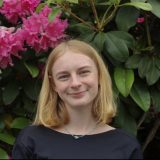
Iris Farnum, B.S.
Iris is originally from Portland, Oregon but went to school at Eckerd College in St. Petersburg, Florida. There, she obtained a B.S. in Biology and Spanish. On campus, she worked the lab of Dr. Denise Flaherty, studying Parkinson’s Disease using a C. elegans model. The summer before her senior year, she worked as a summer intern in the lab of Dr. James Gusella within the Center for Genomic Medicine at Massachusetts General Hospital. Throughout her time in the lab, she worked on a project aimed at understanding the effect of genetic variation on two small molecule splice modulators which were being studied as potential therapeutics for Huntington’s Disease. Following her graduation from Eckerd, Iris moved back to the Pacific Northwest and started working as a research assistant in the lab of Dr. Manideep Chavali at Oregon Health and Science University. There, she developed an independent research project focusing on the role of Stearoyl-CoA desaturase 1 (Scd1) in oligodendrocyte lineage development and central nervous system myelination, with the goal of discovering key pathways to target in the treatment of neonatal hypoxic injury. Iris is looking forward to continuing to work on degenerative disease research through the Pathobiology program. In her spare time, Iris enjoys running, hiking, camping, and spending time with her friends and family.
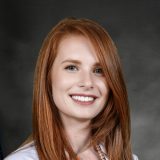
Taylor Godwin, DVM
Taylor is a veterinarian from Southeast Texas. She received a B.S. in Animal Science from Texas A&M University and then went on to complete her M.S. in Agriculture from Missouri State University, where her research focused on estimating dry matter digestibility of forage fiber in equine diets. She later earned her D.V.M. at Louisiana State University. During veterinary school, she was a T35 Summer Research Fellow at Johns Hopkins University, where she worked in the Sfanos lab investigating racial disparities in the tumor microenvironment of prostate cancer. She is currently a Postdoctoral Fellow in the Department of Molecular and Comparative Pathobiology at Johns Hopkins University, where she is pursuing residency training in veterinary anatomic pathology. Her professional interests include comparative pathology, digital pathology, and xenotransplantation—areas where she hopes to integrate her veterinary background with translational medicine. Outside of work, she is a National Reined Cow Horse judge and enjoys judging horse shows, riding her horse, Hoeppli, and spending time with friends and her two dachshunds, Cooper and Gypsy.

Isabella Quintana, B.S.
Isabella (Isa) grew up in Gainesville, Florida before moving to Maine to attend Bowdoin College. There, she earned a bachelor’s degree in Biochemistry with a minor in History. At Bowdoin, Isa was a member of the varsity women’s soccer team and conducted research in the lab of Dr. Danielle Dube, studying the glycans that coat the surface of the pathogenic stomach bacterium Helicobacter pylori. After graduating in 2023, Isa moved to the Upper Valley region of New Hampshire and joined Adimab, a biotechnology company, as a predoctoral research associate. There, she worked on a yeast-based antibody discovery and engineering platform, seeding her interest in targeted therapeutic discovery and motivating her pursuit of a PhD. Outside of research, Isa enjoys being active, sampling new cuisines, and spending time with friends and family.
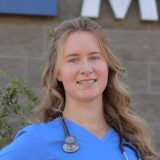
Kaitlin Rickerl, DVM
Kaitlin is a veterinarian from Southern California currently working as a Postdoctoral Fellow through the department of Molecular and Comparative Pathobiology. She graduated with her BS in zoology from California Polytechnic University – Pomona then attended University of California Davis for her DVM degree. During veterinary school, she spent a summer at MIT investigating DNA damage caused by the methyldiazonium ion in vitro. As an undergraduate student she worked on a variety of research projects including herpetology in Southeast Asia and Latin America, neurodegenerative diseases, and addiction. For her PhD, Kaitlin is interested in translational research, particularly in regenerative medicine. She is excited to expand her knowledge on the cellular mechanisms of disease and immune regulation. In her spare time, Kaitlin enjoys spending time with her two dogs (Dobby and Ellie), exploring the East Coast, and reading.

Meng Shi, B.S., M.S.
Meng grew up in Beijing, China. He received a B.S. with honors in Microbiology and a B.A. in Germanics from the University of Washington in Seattle. During his undergraduate studies at UW, he conducted thesis research in Dr. Beth Traxler’s lab, where he used transposon mutagenesis to elucidate the structure-function relationship of the PilC adhesin protein involved in gonococcal infection. He also participated in a study abroad program offered by the Department of German Studies at UW for one semester in Berlin, Germany. After obtaining his bachelor’s degrees, he came to the Johns Hopkins University in 2023 to pursue an M.S.E. in Biomedical Engineering and joined Dr. Karen Sfanos Lab. His master’s project focused on characterizing the morphology and histology of RWPE-1 prostate organoids under varying growth conditions, including androgen exposure, seeding density, and stromal cell co-culture, and evaluating their potential as an in vitro normal prostate epithelium model for studying factors that contribute to early prostate cancer development. In the Pathobiology PhD program, Meng hopes to deepen his understanding of human disease pathology and translational research. In his free time, Meng enjoys reading, traveling, double-checking his math, and contemplating existence, especially when his math doesn’t add up.

Jacqueline Yang, B.S.
Jacqueline was born in Beijing, China. She recently graduated from UCLA, where she earned her B.S. in biochemistry. In her first year, driven by her interest in translational cancer research, she joined the lab of Dr. Hsian-Rong Tseng and Dr. Yazhen Zhu, where she conducted research on the development of extracellular vesicle-based liquid biopsy methods for early cancer detection and treatment response monitoring. Her work has spans across various cancer types, including hepatocellular carcinoma, pancreatic ductal adenocarcinoma, epithelial ovarian cancer, and multiple myeloma. Her experiences cemented her desire to pursue a Ph.D., leading her to join the Pathobiology program. At Johns Hopkins, she hopes to further explore mechanisms of tumor progression and develop clinically relevant diagnostic tools. In her free time, Jacqueline enjoys dancing, baking, reading novels, and watching musicals and random TV shows or movies.
Year 2

Moonki Chae, M.S.
Moonki Chae was born and raised in Seoul, South Korea. Moonki studied Food Bioscience and Biotechnology as double majors at Korea University. In his undergraduate years, Moonki enjoyed volunteer work for more than 300 hours. Moonki hoped to help more people with his own advanced knowledge and expertise, which led him to the field of biomedical research. Moonki studied obesity in his master’s degree program at Korea University. His master’s thesis examined the role of olfactory receptors in reducing high-fat diet intake and promoting weight loss. After graduation, seeking to deepen his understanding of human diseases, Moonki conducted research on steroid-resistant asthma with single-cell analysis at the College of Medicine of Seoul National University and novel signaling components of the mTOR pathway in cancer at Weill Cornell Medicine. Such research on obesity, asthma, and cancer solidified his decision to pursue basic biomedical research in the Pathobiology program that could present viable therapeutic strategies for incurable diseases. Moonki is looking forward to his PhD journey in the Pathobiology department, where he hopes to engage in both basic and translational research. In his free time, you can find him weightlifting at the gym and enjoying local coffee shops.

Tyler Findlay, M.S.
Tyler, a Delaware native, graduated with a B.S. in applied molecular biology and biotechnology, with a minor in animal science, from the University of Delaware. During his undergraduate studies, he worked on various research projects, including characterizing the equine microbiome, producing antibodies from chickens for western blot applications, and studying the EWS/FLI1 oncogene in Ewing’s sarcoma. After graduation, Tyler pursued a master’s degree at the Johns Hopkins Bloomberg School of Public Health in the Department of Biochemistry and Molecular Biology. His literature-based master’s thesis focused on exploring the linkage between type 2 diabetes mellitus, H. pylori infections, and pancreatic ductal adenocarcinoma oncogenesis. Following completing his master’s degree, Tyler worked as a research specialist in the Johns Hopkins Brain and Eye Tumor Laboratory. His research primarily focused on identifying and targeting tumor-specific vulnerabilities through the development of novel combination therapies for aggressive pediatric brain tumors. Tyler’s research in this lab led to his goal in pursuing a Ph.D. focused on translational research, particularly in the oncology field. He is enthusiastic about joining the Pathobiology program and furthering his interest in developing clinical applications through molecular discoveries. Outside the lab, Tyler enjoys camping with his dog Nemo, entertaining his cat Highlander, as well as photography and cooking.

Akash Jain, B.S.
Akash grew up in sunny California in the city of Sunnyvale, just south of San Francisco. He attended UCLA for his bachelor’s, earning him a B.S. in Biochemistry. Since the first year of his undergrad occurred during COVID-19, he became curious to expand his learning beyond the Zoom classroom by joining a research lab. He began working with Dr. Catherine Clarke’s lab at UCLA to study the essential antioxidant coenzyme Q10 (better known as CoQ10) and its biosynthetic machinery. During his time with the Clarke lab, Akash became fascinated by intracellular systems such as autophagy and endomembrane trafficking, as well as lipid-soluble antioxidants. Upon joining the Center for Iron Disorders under Dr. Nicolaos Palaskas, he furthered his antioxidant research studying alterations to the antioxidant redox balance in systems suppressing ferroptosis. Akash looks forward to furthering his passion for understanding fundamental cellular processes by joining it with translational research through the Pathobiology program. In his spare time, Akash enjoys playing sports (namely tennis and pickleball), clay sculpting, playing his alto saxophone, trying new restaurants, and immersing himself in new TV shows.

Michelle Luo, B.S.
Michelle Luo grew up on Long Island, NY and obtained her Bachelor’s in Biology and Neuroscience at the University of North Carolina at Chapel Hill. During her time at UNC, she conducted research in Dr. Alisa Wolberg’s lab investigating pathophysiologic mechanisms of hemostasis and thrombosis. After completing her bachelor’s degree, she continued her work in Dr. Wolberg’s lab as a research technician, with a focus on investigating cellular and molecular mechanisms of thrombosis and bleeding in pancreatic ductal adenocarcinoma. She then moved to Maryland in 2023 to pursue a post-baccalaureate fellowship as a CRTA fellow in the Translational Nanobiology Section of the National Cancer Institute (NCI) under the mentorship of Dr. Jennifer Jones. As a fellow, Michelle investigates extracellular vesicles in cancer, and some of her projects include the study of retroviral elements in tumor-released extracellular vesicles and the evaluation of how radiation therapy affects extracellular vesicle cargo. In her free time, Michelle enjoys traveling, taking walks, and spending time with friends and family.

Rebecca Morton, B.S.
Rebecca grew up in Elmhurst, Illinois and then ventured to Columbus, Ohio to obtain her B.S. in Microbiology at Ohio State University. During her undergraduate studies, she joined the laboratory of Dr. Kristine Yoder and Dr. Richard Fishel where she completed her undergraduate honors thesis on using designer DNA-binding domains to target prototype foamy virus (PFV) for sequence targeted gene therapy. During this project, Rebecca focused her efforts on developing a targetable gene therapy viral vector for monogenic diseases. This project strengthened her interest in translational research. Upon graduating in December 2023, Rebecca continued as a lab technician in her undergraduate lab until her matriculation into Johns Hopkins Pathobiology PhD program. Outside of the lab, Rebecca enjoys being in nature, reading books, and being with her friends, family, and dog.
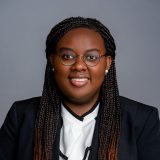
Jasmine Terrell, B.S.
Jasmine Terrell is a proud native of Baton Rouge, Louisiana. She graduated from Howard University earning her Bachelor of Science in Biology. During her time at Howard, she served as part of the fourth cohort of the Karsh STEM Scholars Program. Driven by her scientific curiosity, Jasmine delved into various research opportunities. Her commitment to making a difference led her to Children’s National Hospital where she served as a summer intern under the mentorship of Dr. Natella Rakhmanina. Jasmine investigated the epidemiology and treatment of HIV-positive children in the D.C. metropolitan area, gaining insight into pediatric HIV care. As a scholar in the D.C. Center for AIDS Research Diversity, Equity, and Inclusion Pathway Initiative Program, Jasmine worked under the guidance of Dr. Mark Burke to research microglia activation in the hippocampus of HIV Tg26 mouse models. Exploring her interest in reproductive biology, Jasmine extended her research endeavors to MD Anderson Cancer Center in Houston, Texas as a summer research student. In Dr. Richard Behringer’s lab, she focused on sex differentiation in mammalian reproductive tracts and organs. Furthermore, Jasmine interned at the University of North Carolina at Chapel Hill with Drs. Russell Broaddus and Andrew Gladden. Here, she conducted research on the impact of increased endocrine disruptor pollutants on the incidence and mortality of endometrial cancer in African American women. Her passion for translational research and increasing representation in science has motivated her to pursue a Ph.D. Beyond her academia, Jasmine enjoys travelling, spending time with friends and family, and watching TV/movies.

Lindsey Thurman, DVM
Lindsey is a veterinarian from Tualatin, Oregon, currently working as a Postdoctoral Fellow in the Department of Molecular and Comparative Pathobiology at JHU, where she is perusing residency training in veterinary anatomic pathology. She received an honors BS in zoology followed by a DVM from Oregon State University. Before coming to Hopkins, Lindsey spent two years in practice as a small animal general practitioner in Silverton, Oregon, where she loved performing high volume cat neuters for her clinic's monthly Low Cost Cat Neuter Day. During veterinary school, she spent a summer as a diagnostic pathology fellow at Johns Hopkins, where she learned to perform necropsies and studied epigenetic predisposition factors for human pancreatic ductal adenocarcinoma. She also spent a summer at Cornell University studying proteins involved in chromosomal crossover formation during meiosis. As an undergraduate, Lindsey worked on several research projects, including an investigation into the function of a gonadotropin receptor homologue in sea anemones as a model for coral reproduction, a study on circadian gene expression in gonads of killifish and effects of a potential anti-aging supplement for preserving fertility with age, and a term spent in Panama conducting field experiments on the effects of rainfall on larval barnacle growth. Lindsey is interested in comparative research related to reproductive disease and hormonal effects on disease in humans, domestic animals, and zoo and wildlife species, including neoplasia, subfertility, and infertility. In her free time, Lindsey enjoys gardening, embroidering, baking, hiking, playing board games, and spending time with her boyfriend and their three cats (Milton, Hazlitt, and Freddy Purrcury).
Year 3

Emily Blackwell, DVM
Emily is a veterinarian from Boulder, Colorado. She received a B.A. in Molecular, Cellular, and Developmental Biology from the University of Colorado followed by a D.V.M. from Colorado State University. During veterinary school, she worked in a research lab studying canine lymphoma and leukemia and spent a virtual summer at JHU assessing the efficacy of a newly developed cryoablative device on dermal masses in dogs. Her first introduction to research was in an evolutionary developmental biology lab studying the development of the vertebrate head skeleton. Emily is currently a Postdoctoral Fellow in the Department of Comparative Pathobiology pursuing residency training in veterinary anatomic pathology. Emily is interested in comparative research to advance our understanding of both human and animal disease with a special interest in neoplasia. In her free time, she enjoys hiking with her tiny dog, reading with her cat, camping, scuba diving, baking, and knitting.

Sunyoung Jeong, B.S.
Sunyoung Jeong grew up in Busan, South Korea. She got her Bachelor’s degree from Korea University. As an undergraduate researcher, she worked on a drug repurposing project for the treatment of influenza viral infection in Prof. Manseong Park’s lab. Following her interests in pathogens, she then joined Prof. Jinki Yeom’s lab at Seoul National University to research on dormant population of uropathogenic E.coli. After fulfilling graduation requirements, she took a year off and went to Germany to investigate antimicrobial resistance in gram-negative bacteria at the Federal Research Institute of Nutrition and Food (Max Rubner-Institut) under Dr. Gyu-Sung Cho and Prof. Charles Franz. To explore roles of scientists in industry, she worked at a healthcare startup (Humanscape), where she drafted content on genotype-phenotype relationships for rare and neglected diseases. All these experiences ignited her passion for biomedical research. Currently, her research interests broadly lie in host-pathogen interactions, immune evasion, antibiotic persistence, and impact of the microbiome on the progression of diseases. She is excited to join the Pathobiology program as she aims to find unknown biological mechanisms behind different infections and translate them into real-world applications. Outside the lab, she enjoys singing songs, taking pictures of animals, making Korean food, and running at sunset.

Chi-Fen Lee, DVM, M.S.
Born on the island with great biodiversity, Chi-Fen Lee has encountered plenty of beautiful creatures in Taiwan and is fascinated by them. Chi-Fen received double Bachelor degrees of Animal Science and Veterinary Medicine from National Taiwan University. As an undergraduate, Chi-Fen joined Dr. Hui-Wen Chang’s Lab, where she purified porcine reproductive and respiratory syndrome virus (PRRSV) for the establishment of attenuated vaccine and her passion for research sprouted. She has great interest in vaccine development and wildlife pathology, which motivates her to complete veterinary pathology residency and received her Master’s degree from Graduate Institute of Molecular and Comparative Pathobiology in National Taiwan University. Her master thesis was mainly focused on the vaccine development and phylogenetic analysis of PRRSV. Beside from the main subject, she has devoted extra time for the side project such as discovering of a novel hepatopancreatic parvovirus strain and investigating the genetic character of guinea pig liver diseases. After graduating, Chi-Fen evaluated the efficacy of mRNA-based and modified live attenuated PRRSV vaccine on animal models in Dr Chang’s lab. At the meantime, she screened specimens sent from slaughter houses to monitor critical animal infectious diseases via molecular methods and examination of tissue slides. The idea of One Health has deeply anchored in her mind. That is why Chi-Fen chooses Johns Hopkins School of Medicine as her next stop to continue her academic performance. Chi-Fen loves to hike, birdwatch, play volleyball, and sketch in the spare time.

Cheryl Liu, M.S.
Cheryl grew up in California and obtained her B.S./M.S. in molecular and cellular biology from Johns Hopkins in 2020. While an undergraduate student, Cheryl became interested in neurodegenerative diseases and joined the laboratory of Drs. Ted and Valina Dawson where she studied the alpha-synuclein mediated pathology of Parkinson’s disease. After completing her B.S., she conducted her master’s thesis research on the role of neurexin 1-beta in Parkinson’s disease progression. After she completed and defended her thesis, Cheryl began working as a research specialist in Dr. Christa Habela’s lab in the Neurology department at Hopkins. There she studied the genetic causes of epilepsy using patient derived stem cells and multielectrode array electrophysiological recording. Through her work, Cheryl became very interested in the use of stem cells in the study of disease pathology and the development of potential therapies. This led her to pursue a PhD and she is excited to further her learning and research in the Pathobiology program. In her free time, Cheryl loves to bake, travel, try new foods, and spend time with family and friends.
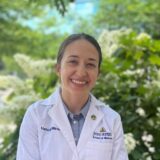
Hana Minsky, B.S.
Hana grew up in Berkeley, California. She earned a Bachelor of Science in Global Disease Biology with a minor in Spanish from the University of California, Davis in 2020. Currently, she is also pursuing her MD as a student in the Johns Hopkins University Medical Scientist Training Program. During her undergraduate years, Hana conducted her practicum research in the lab of Dr. Philipp Zerbe, investigating the antifungal properties of diterpenoid molecules (dolabralexins) found in Zea mays. In addition, she served as the Chief Research Associate for the UC Davis Emergency Medicine Research Association Program. After graduating, Hana continued her exploration of host-pathogen interactions and infectious diseases by working as an assistant research coordinator with the UC Davis Division of Infectious Diseases. In this role, she contributed to clinical trials investigating therapeutics for COVID-19, C. difficile, and various fungal pathogens. Since beginning her studies at Johns Hopkins in 2021, Hana has enjoyed learning more about the role of the immune system in mediating interactions between hosts, microbes, and the environment, all of which are essential for human health. In 2022, she completed a rotation with Dr. Cynthia Sears and Dr. Jessica Queen, conducting research on the role of polymorphonuclear myeloid suppressor cells in the colorectal cancer microenvironment, as well as the role of enterotoxigenic Bacteroides fragilis in the development of colorectal cancer. Hana is very excited to join the Pathobiology program and further pursue her research interests. Outside of her academic pursuits, Hana enjoys hiking, cooking, weightlifting, and playing Ultimate Frisbee.

Alexander Schulick, M.D.
Alex is a Baltimore native. He grew up in Roland Park and moved less than a mile away to attend Johns Hopkins University where he graduated with a Bachelor of Arts in Spanish and a Bachelor of Science in Molecular and Cellular Biology. He spent several summers in the lab of Drs. Barish Edil and Yuwen Zhu at the University of Colorado, aiding in the discovery of a novel T cell receptor co-stimulatory pathway with implications for pancreas and other cancers. This experience solidified his interest in translational science, and he went on to pursue his medical degree, also at the University of Colorado. While there, he studied the role of coagulation indices as a biomarker in pancreas cancer as well as a predictor of donor organ function post-operatively in transplant surgery. He returned to Baltimore to begin a surgical residency in the Department of Surgery at the Johns Hopkins University School of Medicine and has currently completed three years of training. He is joining the Pathobiology program at Hopkins during his academic development time with the aspiration of become an academic transplant surgeon-scientist in the future. He is particularly interested in xenotransplantation and will be joining Dr. Kazuhiko Yamada’s lab studying tolerance mechanisms of kidney xenografts in the pig-to-baboon animal model. Aside from his clinical and research interests, he is a passionate home cook, an impromptu car mechanic and house handyman, a perpetual host and entertainer, a wine enthusiast, and a snowboarding aficionado.

Tajah Vassel, B.S.
Tajah was raised in Ft. Lauderdale, Florida. While earning her high school diploma, she also trained to become a licensed practical nurse. Driven by her interest to better understand the cellular and molecular mechanisms of human disease, she obtained a Bachelor of Science in Biology from Florida State University in December 2021. As an undergraduate, Tajah studied the influence of genetic heterogeneity on colorectal cancer by analyzing tumors with various oncogenic mutations. Upon graduation, Tajah worked at Florida State as a research assistant conducting modifier screens, with a focus on the kinome, to discover novel drug targets in genetically complex tumors. She also aided in projects that explored the tumor-promoting role of senescent cells and alternative cancer treatments. After matriculation into the Pathobiology program, Tajah aims to combine her clinical experience and basic science knowledge to conduct translational research. In her spare time, she enjoys listening to music, cooking foods from different cultures, and spending time with family.

Samhita Vitta, B.Tech, M.Sc.
Samhita is from Chennai, India. She completed her bachelor’s degree in biotechnology from SRM Institute of Science and Technology, India in 2020. Her undergraduate research with Dr. Vijayalakshmi Ramshankar at Cancer Institute (WIA) focused on evaluating the anti-cancer effects of an anti-diabetic drug Meshashringi in cervical cancer. During the COVID-19 pandemic, Samhita interned as a content writer on the website Medindia Health Network where she was able to improve her science communication skills. She also interned with Dr. A. Sumathy at Sri Ramachandra Institute of Higher Education and Research where she helped evaluate the efficacy of Bacopa monnieri as an anti-cancer agent in prostate cancer. Samhita moved to the US in 2021 to pursue her master’s degree in Biochemistry and Molecular Biology at Johns Hopkins. She began working with Dr. Alan Meeker for her master’s thesis. Her primary project focused on evaluating a telomerase-targeting nucleoside analog 6-thio-2’deoxyguanosine, as a potential anti-cancer agent in telomerase-positive and telomerase-negative cells. Samhita is very passionate about translational cancer research which motivated her to pursue a PhD. She is excited to join the Pathobiology program. Outside of academics, Samhita enjoys traveling and exploring new places, watching murder mystery TV shows and spending time walking dogs at MDSPCA.

Bowen Wang, M.S.
Bowen grew up in Anhui, China. She completed her Bachelor’s degree in Pharmacology and Biochemistry from China Pharmaceutical University and the University of Strathclyde, Scotland. During her undergraduate studies, Bowen developed a passion for translational research, with a focus on cellular and molecular mechanisms of cancer and neurodegenerative disease. Her undergraduate thesis focused on the regulation of CXCL12 expression through the NF-κB pathway in osteosarcoma development. After graduation, Bowen gained valuable experience working as a research associate in a biotechnology company that focused on pre-clinical research of new drugs treating Alzheimer's Disease. This experience provided her with greater insight and confidence in her plans to pursue a career in translational research. Therefore, she pursued a Master’s degree in Biochemistry and Molecular Biology at Johns Hopkins University. There, she worked on a study investigating the transcriptional regulation of pancreatic ductal adenocarcinoma (PDAC) progression as her master’s thesis project in Dr. Linda Resar’s lab. Her research focused on the regulation network of High Mobility Group A1 (HMGA1), with a particular emphasis on the regulation of Fibroblast Growth Factor 19 (FGF19) on PDAC tumor progression and stroma formation. This work revealed FGF19 as a potential therapeutic target for a very aggressive subset of human pancreatic cancers. Outside of academia, Bowen enjoys hiking and watching crime series. Her favorite ones are Breaking Bad and Better Call Saul. She is also a Taekwondo player and has been in this field for nearly 15 years.
Year 4
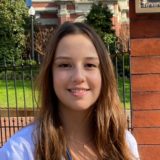
Carolina Duque, B.S.
Carolina grew up in Hamilton, Ontario Canada. She received her Bachelors of Science from Cornell University in 2018, and is currently also earning her MD from Johns Hopkins University School of Medicine. While in undergrad, Carolina became very interested in the host pathogen interplay and joined Dr. Elia Tait-Wojno’s lab to investigating the role of ILC2s in allergy and helminth infection. To further explore the host pathogen interplay from the pathogen perspective, she spent her summers in Dr. Verdu’s lab at McMaster University where she investigated the effects the proteolytic activity of the microbiota on the development of various enteropathies. After graduating, Carolina took a gap year to work in the Universidad de Antioquia in Colombia, evaluating the mechanism of action of various potential anti-Leishmanial drugs. Throughout her work, Carolina became very passionate about neglected tropical diseases, and upon beginning medical school in 2020 she began working with Dr. Gilman and Dr. Mugnier to identify potential biomarkers for Chagas disease progression. Throughout her work, her passion for research continued to grow, and she was inspired to pursue a PhD alongside her MD. Carolina is thrilled to join the Pathobiology program to further her training and research experience. Outside of the lab, Carolina loves to swim, hike, explore Baltimore, and spend time with family and friends.

Tasnim Syakirah Faiez, M.S.
Tasnim Syakirah is from Kuala Lumpur, Malaysia and completed her Bachelor’s degree in Biology at the University of Birmingham, UK. Her undergraduate research focused on infectious disease pathology and surveillance through studying immune modulating viral proteins as well as the detection of viral DNA in the environment, respectively. She subsequently pursued a Master of Science in Immunology from the University of Oxford in the Udalova Lab and conducted her thesis research on the pathogenic role of neutrophil extracellular traps (NETs) in COVID-19. After Tasnim successfully completed her MSc thesis defense, she moved to Imperial College London to work as a research assistant in the Department of Medicine. There she worked in the Singanayagam Lab to elucidate the role of the respiratory microbiome on the early innate immune response to viral infection. Tasnim was a recipient of the AAUW International Fellowship 2022-2023 which allowed her to pursue her PhD in Pathobiology at the Johns Hopkins University. Currently at Johns Hopkins University, Tasnim is working in the Sfanos Lab investigating the role of microbial metabolites on the pathogenesis of prostate cancer. Tasnim’s research interests broadly lie in understanding host-pathogen interactions in the context of various diseases. She hopes to use her education, experience and networks to improve research and treatment in low- and middle-income countries, as well as to improve STEM education and mentorship for women, POC and international students.

Aaron Lewkowicz, B.S.
Prior to obtaining an undergraduate degree, Aaron worked on the frontline of healthcare at Hennepin County Medical Center in Minnesota for five years. This experience inspired him to gain a better understanding of disease by obtaining a bachelor’s degree in Clinical laboratory Science from Northern Michigan University (NMU). There, he also completed a 6-month clinical internship at the Organization of Saint Francis Hospital to obtain ASCP Medical Laboratory Technician licensure and discovered a passion for research while studying nasal bacterial colonization in the laboratory of Dr. Paul Mann. This prompted him to begin independent research with Dr. Mann developing novel molecular assays that can be used at a patient’s point of care, such as a colorimetric Loop-Mediated Isothermal Amplification (LAMP) assay for the detection of methicillin-resistant Staphylococcus aureus (MRSA) to increase the safety of individuals prior to hospital admission or invasive procedures. During the summer of 2017, Aaron had the opportunity to help improve the lives of people with end-stage renal disease, like the many he met as a phlebotomist, by assisting Dr. Andrew Rule as a Summer Undergraduate Researcher at the Mayo Clinic in a morphometric analysis study of kidney biopsies to elucidate the effects of aging and disease on the kidney. After graduating from NMU, Aaron wanted to study newly emerging diseases, such as those common to his home continent of Africa, and came to Dr. Daniela Verthelyi’s laboratory as an ORISE fellow with the US Food and Drug Administration (FDA). With the Verthelyi lab, he aided in developing animal models for emerging pathogens including SARS-CoV-2, Zika virus, and Ebola virus to understand their pathology, identify biomarkers of disease progression, and evaluate therapeutics. Beginning in 2020, he has been supported by the FDA’s Perinatal Health Center of Excellence to lead a study identifying the tropism of Ebola virus in the placenta and assessing whether antibody therapeutics can clear infection from this immune privileged site before matriculating into Johns Hopkins University’s Pathobiology program. Outside of academia, Aaron enjoys live music, camping and hiking, foraging for wild mushrooms, and playing games.
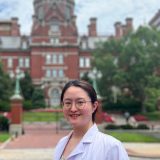
Jin Liu, M.S., M.D.
Jin grew up in the picturesque Gansu Province of China. In 2019, she earned her medical degree from Wuhan University School of Medicine. Following her graduation, she pursued postdoctoral training with Dr. Irina Burd at Johns Hopkins studying placental T-cell heterogeneity in intrauterine infection and inflammation. Through this transformative experience, her passion for immunology took root and flourished. Presently in her second year of the Pathobiology Program, Jin immerses herself in the realm of autoimmune diseases. Under the dual mentorship of Dr. Maximilian König and Dr. Bert Vogelstein, she is eager to uncover underlying mechanisms and next-generation precise therapies for autoimmune diseases such as APS and SLE. Outside of the lab, she enjoys reading, playing with her cat, whipping up delicious dishes especially dumplings to share with friends.

Kin Israel Notarte, M.S., M.D.
Kin Israel Notarte is from the Philippines and completed Bachelor of Science in Biology from Silliman University, Master of Science in Microbiology, and Doctor of Medicine both from the University of Santo Tomas (UST). His research interests include infectious diseases, immunology, and vaccinology. During the COVID-19 pandemic, he worked under Prof. Allan Patrick Macabeo from UST to identify natural products that could target SARS-CoV-2 host cell entry and replication employing computational techniques. Working alongside Dr. Brandon Michael Henry from the Cincinnati Children's Hospital Medical Center in Ohio, he got involved in evidence-based medical research shedding light on the intricate variations in the immune response among individuals receiving the SARS-CoV-2 mRNA vaccine as well as explored the protective effects of COVID-19 vaccination against long COVID development. Recently, he has joined the lab of Prof. Susan Eshleman to further understand HIV diversity and dynamics, and how these factors could impact viral transmission, disease progression, and treatment outcomes. In his spare time, he loves to travel, watch anime, and read fictional books.
Year 5+

Jade Alvarez, M.S.
Jade Alvarez is originally from the Dominican Republic. She received her Bachelor of Science in Biology from Rowan University in 2019 and will earn her Master’s in Biology from Towson University in summer, 2021. During her undergraduate experience, Jade was awarded a NASA-sponsored fellowship which allowed her to join Dr. Michael Henry’s lab at the Rowan University Graduate School of Biomedical Sciences during the summer of 2017. There, Jade investigated dysfunctions in the mitochondrial genome that are linked to mitochondrial diseases. Her desire to engage in a full-time research experience led me to pursue an M.S. degree at Towson University in the fall of 2019. Captivated by the elaborate hijacking mechanisms employed by certain viruses Jade joined Dr. Barry Margulies’ lab where she studies the interaction between two proteins that may aid in viral egress during Human Cytomegalovirus infection. Throughout her time as a Master’s student, Jade also became very intrigued about the field of cancer immunology although her fascination for viruses remains. Jade’s research interests in further understanding viral-host interactions and navigating the field of cancer immunology urged her to pursue further training. Jade is mentored by Dr. Richard Roden and works on investigating basic mechanisms of Human Papillomavirus infection, characterizing antibody-dependent cell-mediated effects of L2-specific antibodies, and assessing antibody and T cell responses by HPV vaccinated individuals. Outside of academics and research, Jade enjoys traveling and exercising. She also enjoys mentoring and advocating for younger students of underrepresented backgrounds who want to pursue careers in STEM.
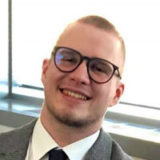
Niklas Bachmann, B.Sc.
Niklas is from the Munich area in Germany, but, after studying Mechanical Engineering in Oxford, UK and Munich, Germany for a while, moved to the Netherlands where he completed his BSc in Nanobiology at the Delft University of Technology. During his undergrad, he worked in the Iwasaki Lab at the Tokyo Institute of Technology and the Wyman Lab at the Erasmus University Rotterdam, both of which focused on DNA damage repair and particularly homologous recombination, in yeast and mammalian cells, respectively. After graduation, he moved to Chicago in order to join the Campbell Lab at the Loyola University Chicago. During this time, he studied the mechanisms and interactions underlying the nuclear import of HIV-1 in non-dividing cells, primarily using various imaging techniques. Following his time at Loyola, he joined the Golovkina Lab at the University of Chicago as a Research Assistant, and contributed to various projects related to retroviral infection and genetic susceptibility to autoimmune disorders in mice. Now, as a member of the Siliciano Lab, Niklas designs and validates immunotherapeutic reagents targeting HIV-infected cells through HLA-E. Whenever he is not in the lab, Nik is usually out hiking, traveling, or relaxing in some park with music and food.

Stephen Brown, M.S.
Stephen is from Baltimore, Maryland and graduated from Gettysburg College with a Bachelor’s of Science in Biochemistry and Molecular Biology. At Gettysburg he researched surfactant like protein interactions with lipid membranes and explored their potential as novel therapeutics. During summers between semesters he worked at two neuroscience labs at Hopkins studying cortical laminar innervation patterning and neuronal mRNA transcript localization. Upon graduating in 2017, he worked as a research technician in the Zahnow lab at Hopkins, where he developed an appreciation for translational research. His work focused on developing and understanding the mechanisms of novel epigenetic therapies for breast and ovarian cancer. His more recent research was dedicated to understanding how epigenetic and genetic changes induced by ethanol consumption can lead to breast cancer. Stephen’s research interests are profoundly impacted by the diversity of his experiences, and he is interested in studying neurodegenerative disorders with an emphasis on epigenetics. Stephen enjoys photography, biking, music, and exploring new places.

Megan Hess Check, B.S.
Megan is from Fairfax, Virginia and studied Biology and Art History at Creighton University in Omaha, Nebraska. During her time at Creighton, Megan discovered her passion for microbiology and actively participated in research investigating enzyme kinetics in uropathogenic Proteus mirabilis and the role of transketolase enzymes in Salmonella enterica. After earning her Bachelor’s degree, Megan pursued immunology-focused research and started a post-baccalaureate IRTA fellowship at the National Cancer Institute. Megan led a project examining regulatory T cell (Treg) dysfunction in a mouse model experiencing chronically elevated levels of a pro-inflammatory cytokine, interferon gamma (IFN-g). In 2020, Megan joined the Pathobiology program and began conducting her doctoral research in Dr. Karen Sfanos’ lab the following year. Both Megan and Dr. Sfanos share an interest in understanding how bacteria and infection-driven inflammation disrupt homeostasis and contribute to human disease. Megan’s ongoing research is prostate cancer-focused and explores two key aspects: (1) novel mechanisms for bacterial-mediated carcinogenesis in the prostate and (2) the role of inflammation in driving lineage plasticity in prostate epithelial cells. Upon completing her PhD, Megan aspires to pursue a career in clinical microbiology and plans to apply to CPEP fellowship programs. Outside of the lab, Megan enjoys roller skating, hiking Maryland state parks, and taking care of her aquarium.

Ying-Yu (Ashley) Chen, M.S.
Ying-Yu (Ashley) Chen is from Taipei, Taiwan. With a B.S. in public health, Ying-Yu received her M.S. in microbiology and immunology from National Defense Medical Center in July 2018. In graduate school Ying-Yu dedicated herself to autoimmune disease research in the lab of Dr. Sytwu Huey-Kang to understand the regulatory role of Xbp1 in dendritic cells during the development of autoimmune diabetes in nonobese diabetic mice. She joined the Pathobiology Program because the diverse research fields in the Program will help her to gain more knowledge of diseases and hands-on research skills. Ashley is a member of Stephen Baylin’s lab, focusing on the effect of epigenetic treatments on the functions of dendritic cells during tumor development. In her leisure time, Ying-Yu loves to cook, read, watch TV, and hang out with friends. Ying-Yu is also our Margaret Lee Student this year.

Jun (Tony) Choe, B.S.
Tony grew up in Suwanee, Georgia and received his Bachelor of Science degree in Biochemistry and Molecular Biology from the University of Georgia in May 2019. As an undergraduate, his research focused on how undergraduate science students respond in the face of academic failures in upper-level science classes. After graduating, he moved to Rockville, Maryland and started working at the Early Translational Branch of the National Center for Advancing Translational Sciences as an NIH IRTA postbaccalaureate research fellow. As a fellow, Tony was a part of several high-throughput compound screening efforts, including inhibitors of CpG island cytosine methylation, multiple ubiquitin-specific proteases, and proteins involved in SARS-CoV-2 entry. In his spare time, he likes listening to music and practicing piano.

Cheng-Chieh Huang, M.S.
Cheng-Chieh is from New Taipei City, Taiwan and completed the bachelor degree in Life Science at National Chung Hsing University. He investigated how protein kinase regulate lamin assembly in laminopathies, and it ignited him to apply to the Master’s program of Biochemistry and Molecular Biology at National Taiwan University. To equip himself with the proteomic skills, he joined the proteomic core lab of Dr. Lu-Ping Chow. He focused to explore the relationship between pancreatic cancer and type II diabetes, elucidating how a family of proteins called galectins affected insulin resistance and energy metabolism in detailed mechanism. After graduation, he became a RA in the Institute of Biomedical Sciences at Academia Sinica to continually study the role of galectins in an inflammatory disease called psoriasis. Cheng-Chieh’s research interest lies in the broad discipline of cancer biology, metabolism, inflammation and immunity. In his casual time, Cheng-Chieh enjoys reading, hiking and watching movies.

Si-Sim Kang, M.Sc.
Si-Sim obtained her Bachelor’s degree in life science from National Taiwan University in 2018. As an undergraduate student, Si-Sim worked on a project focusing on a specific population of foxp3- T cells that exert regulatory functions after co-culturing with B cells in Dr. Bor-Luen Chiang’s lab at National Taiwan University. During the summer of her junior year, she participated in the Biological Undergraduate Summer School program at the University of Zurich. Si-Sim worked full-time with Dr. W. Wei-Lynn Wong on a project to understand how the X-linked inhibitor of apoptotic protein (XIAP) participated in necroptosis. She decided to pursue a career in biomedical research after undertaking this project. Si-Sim received a Master’s degree in immunology at National Taiwan University in 2020. She worked with Dr. Chiang again studying the application of mesenchymal stem cell (MSC) therapy for primary biliary cholangitis using a murine model of autoimmune cholangitis. In her thesis, she focused on how the administration of MSCs can affect the composition of the liver lymphocyte subpopulation and ameliorate the disease outcome. In her free time, Si-Sim enjoys reading, hiking, traveling and playing piano.

Che-Min (Mason) Lo, M.S.
Che-Min is from Hsinchu, Taiwan and received his B.S. and M.S. degree in Life Science (Division of Biomedical Science) from Tunghai University in 2016. Fascinated by the underlying mechanisms of diseases, he joined Dr. Mingli Hsieh’s Lab in the field of molecular medicine as early as in his sophomore year. It was so interesting to uncover human CAVIII gene regulation in the cells harboring A8344G mtDNA point mutation (MERRF disease model), so that he entered graduate school to continue this topic. Finally, he accomplished his graduate thesis and published the result in a journal paper as the first author. After building a solid foundation in biochemistry, cellular and molecular biology, with a strong desire to make more impacts on the bedside, he decided to be a translational researcher that built connections between lab and clinic. In 2017, he became a RA working in the Microbiology and Genomics Lab of Taichung Veteran General Hospital. In the process of discovering biomarkers for patients with latent tuberculosis infection, he found his passion with studying the host-pathogen interaction on molecular level. To explore more aspects of clinical tests, he started to work at Toxicology Division, China Medical University Hospital in 2019. He conducted a project to optimize and set up an immunochromatographic strip for testing viper envenomation and established a proper condition for rapid identification of viper snakebites. In his free time, Che-Min enjoys jogging, doing the gym but not often, and outdoor activities.

Alex Luo, M.S.
Chun Huai (Alex) Luo is from Taipei, Taiwan. He first came to the US in 2012 to study English in an ESL program. He then attended the University of Wisconsin-Stevens Point and obtained a Bachelor of Science degree in biology with a minor in chemistry. During his undergraduate career, he studied various aspects of life-history evolution using lizards as a model organism. After graduating from undergrad, Alex obtained a Master of Science in Bacteriology from the University of Wisconsin-Madison. For his thesis research, he engineered “infectivity switches” in bacteriophages that control their infectivity against the host bacteria using inducers in a dosage-dependent manner. After Alex successfully passed his MS thesis defense, he moved to Baltimore and started working as a research technologist in the School of Medicine at Johns Hopkins University. During his time at Hopkins, Alex has been using high-throughput next generation sequencing to conduct surveillance studies to better understand the circulating strains (variants) of SARS-CoV-2. In his free time, Alex enjoys playing with his dog, outdoor activities, fishing, traveling, seafood and cooking.
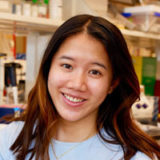
Sharon Onggo, B.S.
Sharon grew up in San Diego, CA and graduated from Massachusetts Institute of Technology (MIT) with a Bachelor of Science in Biology in 2021. Sharon’s research interests are largely driven by the question: ‘How do living things respond to and shape their environment?’ As an undergraduate at MIT, she first explored this question at the molecular level in John Essigmann's lab, investigating environmental toxin-induced hepatocellular carcinoma (HCC). Due to a growing interest in developmental biology, Sharon began working under the direction of Dr. Harvey Lodish and Dr. Hojun Li in 2019. Under their direction, Sharon studied red blood cell development in the context of Diamond-Blackfan anemia (DBA). Her investigations centered on the translational efficiency of the erythroid master transcription factor, GATA1. Sharon was one of 11 students chosen to present at the MIT Biology 2021 Undergraduate Research Symposium and was inducted into Phi Beta Kappa for her academic achievement.
Sharon joined the Johns Hopkins Pathobiology program in August 2021. As a graduate student, she has continued to apply insights from basic developmental biology to clinical problems. Under the guidance of Dr. Patrick Cahan and Dr. Aaron James, Sharon studies how gene regulatory networks are established during synovial joint development and subsequently perturbed in osteoarthritis.
In her free time, Sharon enjoys going on long walks with her dog and husband.

Bailey West, B.S.
Bailey is from Stockton Springs, Maine, and graduated from the University of Maine in spring 2021 with a bachelor’s degree in biochemistry. As an undergraduate, she worked in the lab of Dr. Julie Gosse studying the effects of the popular personal-care antimicrobial agent cetylpyridinium chloride (CPC) on mast cell function and signaling. During the summers, Bailey participated in research internships spanning protein conservation, clinical research, and genomics. Together, these diverse experiences converged on Bailey’s interest in investigating disease mechanisms, which led her to join the Pathobiology program. Bailey is a member of Dr. Linda Resar’s lab, where she is studying the role of the chromatin regulator HMGA1 in KMT2A-rearranged acute myeloid leukemia. Outside of the lab, Bailey enjoys Pilates, traveling, and spending time outdoors. (Photo courtesy of the University of Maine)
Meet a Ph.D. Student
Katie Marshall talks about her experiences in the Pathobiology PhD program.
